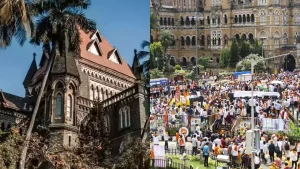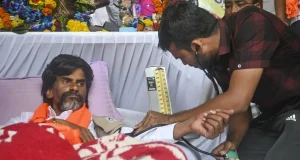Maharashtra – The Manoj Jarange Protest reached a successful conclusion on Tuesday as activist Manoj Jarange Patil ended his five-day hunger strike at Mumbai’s Azad Maidan after the Maharashtra government accepted several crucial demands regarding Maratha community reservations. The breakthrough marks a significant victory for the Maratha community’s long-standing struggle for adequate representation in education and government employment.
The 43-year-old activist accepted a glass of fruit juice offered by senior BJP minister Radhakrishna Vikhe Patil, who heads the cabinet sub-committee on Maratha reservation, symbolically ending the Manoj Jarange Protest that had captured statewide attention since August 29. The emotional moment was witnessed by thousands of supporters who cheered loudly as their leader broke his fast with tears in his eyes.
Historic Agreement on Kunbi Caste Certification Process

The resolution of the Manoj Jarange Protest came following intensive negotiations between Jarange and a state cabinet sub-committee. The government’s acceptance of key demands represents a major policy shift that could benefit thousands of Maratha families seeking access to reservations under the Other Backward Classes category.
Central to the agreement is the government’s commitment to issue Kunbi caste certificates to eligible Marathas. The Kunbi community, recognized as an agrarian Other Backward Classes caste, provides a legal pathway for Marathas to access reservation benefits that have long been sought by the community.
A government resolution issued immediately after the talks outlined a comprehensive framework for identifying and certifying Marathas as Kunbis. This systematic approach addresses one of the primary concerns raised during the Manoj Jarange Protest regarding the need for transparent and accessible certification processes.
Detailed Verification Framework Established

The Maharashtra government has established a robust verification system to ensure the integrity of the certification process that emerged from the Manoj Jarange Protest. A dedicated committee will facilitate the issuance of Kunbi caste certificates to Marathas who can provide adequate documentary evidence of their lineage.
Historical references from the Hyderabad gazetteer will serve as the primary guide for the verification process, providing a standardized framework for evaluating claims. This historical documentation approach ensures that the certification process maintains academic and legal rigor while remaining accessible to eligible applicants.
The verification process will be implemented at the village level through specialized panels comprising gram sevaks, talathis (revenue officials), and assistant agriculture officers. This decentralized approach ensures that applicants can access services locally without facing bureaucratic delays that might otherwise complicate the certification process.
Documentary Evidence Requirements
Individuals seeking Kunbi caste certification under the framework established by the Manoj Jarange Protest must provide substantial evidence of their ancestry. The primary requirement involves presenting land records dated prior to November 21, 1961, which serve as proof of Kunbi ancestry within their family lineage.
This date-specific requirement ensures that applications are based on historical documentation rather than recent claims, maintaining the integrity of the OBC reservation system while providing legitimate access to eligible Maratha families. The emphasis on documentary evidence reflects the government’s commitment to creating a legally sound framework that can withstand judicial scrutiny.
Additional forms of evidence may include historical records, village documentation, and other relevant materials that establish the applicant’s connection to the Kunbi agricultural community. This comprehensive approach ensures that genuine cases receive proper recognition while preventing fraudulent applications.
Chief Minister Fadnavis Welcomes Resolution


Maharashtra Chief Minister Devendra Fadnavis expressed satisfaction with the peaceful resolution of the Manoj Jarange Protest, emphasizing his administration’s commitment to delivering justice to the Maratha community through lawful and fair processes. His statement reinforced the government’s position that the resolution represents a balanced approach to addressing community concerns.
Fadnavis acknowledged the collaborative efforts of Deputy Chief Ministers Eknath Shinde and Ajit Pawar, along with Radhakrishna Vikhe Patil and the entire cabinet sub-committee, in reaching this agreement. The Chief Minister’s recognition of these officials highlights the comprehensive governmental approach that enabled the successful conclusion of the Manoj Jarange Protest.
The Chief Minister clarified that caste certificates would be issued to individuals based on merit and evidence rather than blanket community-wide recognition. This individual-based approach ensures compliance with existing legal frameworks while addressing the specific needs raised during the protest.
Addressing Community Concerns and Legal Framework
Fadnavis addressed misconceptions within the OBC community regarding Maratha reservations, emphasizing that the resolution emerging from the Manoj Jarange Protest does not compromise existing OBC rights. His clarification aimed to prevent inter-community tensions while ensuring that all stakeholders understand the legal boundaries governing reservation policies.
The Chief Minister stressed that his government remains committed to the welfare of all communities in Maharashtra, including Marathas, OBCs, and others. This inclusive approach demonstrates the administration’s effort to balance diverse community interests while maintaining social harmony.
Medical Care and Future Implications


Following the conclusion of his fast, Jarange was immediately taken to a hospital for comprehensive medical evaluation, reflecting the physical toll of his five-day hunger strike. His commitment to the cause, demonstrated through this personal sacrifice, has garnered significant respect across Maharashtra’s political spectrum.
The successful resolution of the Manoj Jarange Protest establishes a precedent for addressing community concerns through dialogue and negotiation rather than prolonged agitation. The framework created through these negotiations will likely serve as a model for future policy discussions regarding reservation and social justice issues in Maharashtra.
The implementation of this agreement will require careful monitoring to ensure that the certification process operates efficiently and transparently, fulfilling the promises made during the negotiations that ended this significant protest movement.

